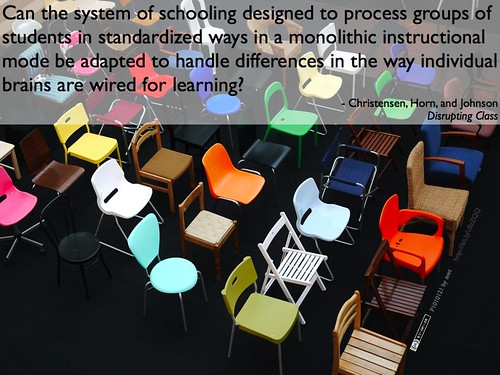photo attributed to ecastro
Shifting the conversations in our schools from “How can we improve test scores,” to “How can we design learning opportunities that engage and motivate students,” is a great conversation to have. Looking at what other countries score is one way of measuring our effectiveness but it is not the only or best way. Recently, standardized testing has come under fire and the idea that teachers are teaching to the test is disheartening, because if it is true we are doing a disservice, if it is not then perception is overshadowing reality. I recently left the following comments on Ben Grey’s blog, The Edge of Tomorrow.
I think assessment is necessary, and yes even the state mandated assessments are necessary. It’s mining the data that can and should change, what does the data tell us, is it growth, is it teacher effectiveness, is it both, is it neither?
A lot of brilliant people disagree with me, and I would just ask that they think of better solutions and ways to improve the collection methods, not just “rant” against the current design. I want accountability for my child’s school and teacher, I want it as a teacher myself as well. I want to be able to measure if I’m doing “it” well, whatever “it” is. We need to shift a lot of old school thinking in schools, that’s been talked about and debated ad nauseum, continuous and standardized assessment is a piece of this conversation.
Why are we so afraid of national standards and assessments? I think for me, the “it’ is the objectives, or the scope and sequence around what we are teaching. Ongoing assessment drives our planning and instruction, if there is some consistency in how we are assessing and the results are reliable, I’m all for it, but unfortunately that doesn’t always happen across grade levels, districts, and states.
You bring up a good point about the gap between an ongoing assessment and yearly assessment, that is where something needs to happen, that is a flaw in one or both of the assessments.
Alfie Kohn back in January shot holes in the case for National Standards, here, Not sure that I agree, but here are a couple interesting bits from that article.
“On 8th grade math and science exams, eight of the 10 top-scoring countries had centralized education systems, but so did nine of the 10 lowest-scoring countries in math and eight of the 10 lowest-scoring countries in science.”
I do agree with this statement though,
“Offered a list of standards, we should scrutinize each one, but also ask who came up with them and for what purpose. Is there room for discussion and disagreement—and not just by experts—regarding what, and how, we’re teaching and how authentic our criteria are for judging success?”
A couple of recent pieces that extend and promote discussion on this conversation one form the NY times and another from the BBC.
One possible solution is to allow the government to maintain control over standards, as I listed above, I’m not sure I agree with this, the stats can be picked apart, but I do think some sort of “national” accountability would be a good thing, I honestly don’t have that solution in my pocket as of yet. So, how can we maintain the “uniqueness of our system, while still meeting global benchmarks?
America’s system of standards, curriculums and testing controlled by states and local districts with a heavy overlay of federal rules is a “quite unique” mix of decentralization and central control, Mr. Schleicher said. More successful nations, he said, maintain central control over standards and curriculum, but give local schools more freedom from regulation, he said.
“The question for the U.S. is not just how many charter schools it establishes,” he said, “but how to build the capacity for all schools to assume charter-like autonomy, as happens in some of the best-performing education systems.”
“In one way, international education benchmarks make disappointing reading for the U.S.,” he said.
http://www.nytimes.com/2010/03/10/education/10educ.html?emc=eta1
So more time and teacher contact is the answer you presume, well that is not necessarily so.
Finland's schools score consistently at the top of world rankings, yet the pupils have the fewest number of class hours in the developed world.
http://news.bbc.co.uk/2/hi/programmes/world_news_america/8601207.stm <http://news.bbc.co.uk/2/hi/programmes/world_news_america/8601207.stm>
As usual, I don’t have the answers, this is just my reflections on the conversations I’ve been wanting to have lately, I am a lifelong learner that will continue to push my own thinking on this and other educational topics that interest me. We should all be a part of these conversations if we have a passion for education, and (in my opinion) we need to be prepared to listen to people that disagree with us.

No comments:
Post a Comment